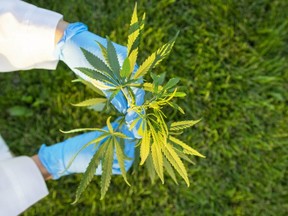“Though hashish customers versus non-users ought to theoretically have the next chance of diabetes, epidemiological research recommend in any other case.”

Article content material
About 11 million Canadians reside with diabetes or prediabetes. Within the U.S., greater than 34 million people have diabetes , which is about one in 10 People. In 2019, diabetes accounted for almost 90,000 deaths within the U.S.
Commercial
This commercial has not loaded but, however your article continues beneath.
Article content material
Citing diabetes as an essential public well being downside, researchers from Texas A&M College just lately assessed the affiliation between hashish use and diabetes by intercourse amongst U.S. adults. They discovered that girls who consumed hashish regularly had been lower than half as more likely to be identified with diabetes than ladies who abstained.
-

Diabetes and marijuana: Here’s what the plant can do
-

Cannabis researchers find breakthrough treatment for diabetes, high cholesterol
-

Study: Two hemp compounds shown to stop coronavirus from entering human cells
The research, revealed within the journal Cannabis and Cannabinoid Research, concerned greater than 15,000 individuals and information was abstracted from the Nationwide Well being and Diet Examination Survey from 2013 by way of 2018. Hashish use was estimated from publicity standing and frequency of use.
Commercial
This commercial has not loaded but, however your article continues beneath.
Article content material
The vast majority of individuals had been white ladies. Researchers discovered, that whereas ladies who regularly used hashish had been much less more likely to be identified with diabetes, there was no important distinction for girls who consumed hashish often.
For males, hashish use was not considerably related to diabetes, whatever the diploma of publicity.
The researchers concluded that additional research are wanted to “discover the sex-based heterogeneity-and particular person and contextual elements responsible-in the affiliation between hashish use and diabetes mellitus.”
A 2018 research out of the College of Toronto additionally discovered that hashish use is related to decrease odds of diabetes in adults.
The research, revealed within the journal Drug and Alcohol Review , examined the connection between hashish use and diabetes whereas accounting for a spread of potential confounders, together with psychological well being problems.
Commercial
This commercial has not loaded but, however your article continues beneath.
Article content material
Researchers discovered that sufferers with a historical past of hashish use possessed about 20 per cent decreased chance of diabetes in comparison with non-users, whereas those that used hashish inside the previous yr possessed an roughly 50 per cent decreased threat, per NORML .
“In sum, a decreased chance of diabetes for each lifetime and 12-month hashish customers versus non-users was discovered after accounting for a spread of potential confounders, together with psychological well being problems,” the research authors concluded.
The researchers additionally known as for additional research and famous that “the connection between hashish use and diabetes is puzzling.”
“Though hashish customers versus non-users ought to theoretically have the next chance of diabetes, epidemiological research recommend in any other case,” they wrote.
A 2017 U.Okay.-based research discovered that THCV (tetrahydrocannabivarin), a non-psychoactive hashish compound, was positively related to glycemic management in sort 2 diabetics. Revealed within the journal Diabetes Care, researchers concluded that “THCV may symbolize a brand new therapeutic agent in glycemic management” for these residing with the illness.
Diabetes Canada recommends that folks with type 1 and type 2 diabetes get an assessment from their health professional for steerage on hashish use.
Commercial
This commercial has not loaded but, however your article continues beneath.
Article content material
Subscribe to Weekend Dispensary , a brand new weekly publication from The GrowthOp.














